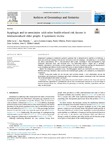Dysphagia and its association with other health-related risk factors in institutionalized older people: a systematic review

Ver/
Use este enlace para citar
http://hdl.handle.net/2183/32770
A non ser que se indique outra cousa, a licenza do ítem descríbese como Creative Commons Attribution-NonCommercial-NoDerivs 4.0 International License (CC-BY-NC-ND 4.0)
Coleccións
- Investigación (FCS) [1293]
Metadatos
Mostrar o rexistro completo do ítemTítulo
Dysphagia and its association with other health-related risk factors in institutionalized older people: a systematic reviewAutor(es)
Data
2023-03-07Cita bibliográfica
Leira J, Maseda A, Lorenzo-López L, Cibeira N, Leira J, Maseda A, Lorenzo-López L, Cibeira N, López-López R, Lodeiro L, Millán-Calenti JC. Dysphagia and its association with other health-related risk factors in institutionalized older people: a systematic review. Arch Gerontol Geriatr. 2023 Jul;110:104991.
Resumo
[Abstract] Background: Dysphagia is considered a geriatric syndrome that is characterized by inability to or difficulty in safely and effectively forming or moving the food bolus toward the esophagus. This pathology is very common and affects approximately 50% of institutionalized older people. Dysphagia is often accompanied by high nutritional, functional, social, and emotional risks. This relationship implies a higher rate of morbidity, disability, dependence, and mortality in this population. This review is aimed at studying the relationship between dysphagia and different health-related risk factors in institutionalized older people.
Method: We conducted a systematic review. The bibliographic search was performed in the Web of Science, Medline, and Scopus databases. Data extraction and methodological quality were evaluated by two independent researchers.
Results: Twenty-nine studies met the inclusion and exclusion criteria. A clear relationship between the development and progression of dysphagia and a high nutritional, cognitive, functional, social, and emotional risk in institutionalized older adults was found.
Conclusions: There is an important relationship between these health conditions that shows the need for research and new approaches to considerations such as their prevention and treatment as well as the design of protocols and procedures that will help reduce the percentage of morbidity, disability, dependence, and mortality in older people.
Palabras chave
Cognitive impairment
Dysphagia
Institucionalized
Older people
Risk factors
Swallowing pathologies
Dysphagia
Institucionalized
Older people
Risk factors
Swallowing pathologies
Versión do editor
Dereitos
Creative Commons Attribution-NonCommercial-NoDerivs 4.0 International License (CC-BY-NC-ND 4.0)
ISSN
0167-4943






